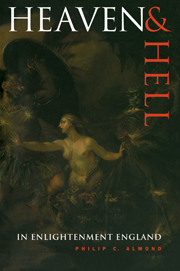3 - The contours of heaven and hell
Published online by Cambridge University Press: 18 December 2009
Summary
HELL'S TORMENTS
We have heard … of some who have endured breaking on the Wheel, ripping up of their Bowels, fleaing alive, racking of Joynts, burning of Flesh, pounding in a Mortar, tearing in pieces with Flesh-hooks, boyling in Oyl, roasting on hot fiery Gridirons, etc. And yet all these, tho' you should superad thereto all Diseases, such as the Plague, Stone, Gout, Strangury, or whatever else you can name most torturing to the Body … they would all come short … of that Wrath, that Horror, that unconceivable Anguish which the Damned must inevitably suffer every Moment, without any Intermission of their Pains, in Hellish Flames.
Readers of John Shower in 1700 would have been quite familiar with the spectacle of sufferings inflicted publicly on the bodies of those convicted of crime. Public punishments, corporal and capital, were dramatic representations of the power of life and death which the body politic held over its subjects. Capital punishment was intended to deter, and to terrify those who witnessed it. And the farewell speech of the convicted was intended for the admonishment and betterment of its listeners. In 1680 for example, John Marketman, convicted of the murder of his wife, made a typical speech, declaring
That he had been very disobedient to his too indulgent parents, and that he had spent his youthful days in profanation of the Sabbath and licentious evils of debaucheries beyond expression, and that he had been over penurious in his narrow observance of his wive's ways, desirous that all should pray to the Eternal God for his everlasting welfare, and with many pious expressions ended this mortal life.
- Type
- Chapter
- Information
- Heaven and Hell in Enlightenment England , pp. 81 - 110Publisher: Cambridge University PressPrint publication year: 1994



